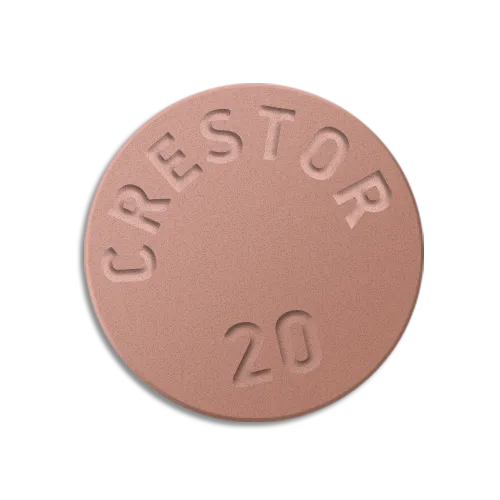Introduction
Crestor, containing rosuvastatin, is a potent statin medication designed to manage cholesterol levels and reduce cardiovascular risks. By inhibiting HMG-CoA reductase, a liver enzyme responsible for cholesterol production, Crestor helps prevent artery blockages and related heart conditions. This guide explores its uses, benefits, efficacy, safety, and convenient dosing for patients and healthcare providers.
Main Uses
Crestor is primarily prescribed to lower high cholesterol levels, targeting low-density lipoprotein (LDL) and triglycerides while increasing high-density lipoprotein (HDL). This lipid regulation reduces the risk of heart attacks, strokes, and other cardiovascular issues in patients with elevated cholesterol or mixed dyslipidemia. It’s also effective for managing hereditary conditions like familial hypercholesterolemia.
Key Advantages
- Lipid Control: Significantly reduces LDL and triglycerides while boosting HDL for optimal lipid balance.
- Cardiovascular Protection: Decreases the risk of heart attacks, strokes, and other heart events by slowing atherosclerosis.
- Anti-Inflammatory Effects: Reduces vascular inflammation, enhancing heart health.
- Additional Benefits: Improves endothelial function and stabilizes arterial plaques, offering comprehensive heart protection.
Effectiveness
Clinical studies confirm Crestor’s ability to effectively lower cholesterol and reduce heart risks. It can decrease LDL levels by up to 50% in many patients, achieving significant lipid improvements. Crestor also reduces cardiovascular events, making it a trusted option for long-term cholesterol management.
Safety Profile
Crestor is generally well-tolerated, with common side effects including headaches, muscle aches, abdominal discomfort, fatigue, and nausea, which are typically mild. Persistent or severe symptoms should be reported to a doctor. Rare but serious side effects, such as rhabdomyolysis or liver dysfunction, require immediate medical attention. Regular monitoring of liver and kidney function is recommended.
Dosing Flexibility
Crestor is taken once daily, with or without food, offering dosing convenience. Starting doses range from 5 mg to 10 mg, adjusted based on patient response, with a maximum of 40 mg daily. This flexibility allows tailored treatment plans to optimize efficacy and minimize side effects.
Indications
Crestor is approved for managing high cholesterol, mixed dyslipidemia, and hereditary hypercholesterolemia. It also reduces cardiovascular risks in patients with elevated cholesterol and other risk factors.
- High Cholesterol: Lowers LDL and triglycerides, increases HDL.
- Mixed Dyslipidemia: Addresses high LDL/triglycerides and low HDL.
- Hereditary Hypercholesterolemia: Effectively manages genetic cholesterol disorders.
- Cardiovascular Risk Reduction: Prevents heart attacks and strokes in high-risk patients with conditions like diabetes or hypertension.
Administration Guidelines
High Cholesterol/Mixed Dyslipidemia: Start at 10–20 mg daily, up to 40 mg as needed.
Hereditary Hypercholesterolemia: Begin at 20 mg, adjust accordingly.
Timing: Take once daily at the same time, with or without food. If a dose is missed, take it soon unless close to the next dose.
Precautions: Avoid grapefruit to reduce the risk of side effects.
How It Works
Crestor blocks HMG-CoA reductase, reducing cholesterol synthesis in the liver and increasing LDL clearance through enhanced receptor activity. This lowers LDL and triglycerides, raises HDL, and reduces plaque formation risks.
Ingredients
Active Ingredient: Rosuvastatin calcium, responsible for cholesterol reduction.
Inactive Ingredients: Includes lactose, magnesium stearate, and microcrystalline cellulose for tablet stability.
Potential Side Effects
Common: Headaches, muscle pain, stomach upset, fatigue, nausea.
Less Common: Joint pain, memory fog, confusion.
Serious: Rhabdomyolysis (severe muscle pain, dark urine) or liver issues (yellowing skin, extreme fatigue) require urgent care.
Minimizing Side Effects
Adhere to prescribed doses and report muscle pain or weakness immediately. Regular liver and kidney function tests are advised. A balanced diet and exercise can complement treatment and reduce risks.
Contraindications
Do not use if allergic to rosuvastatin, have active liver disease, unexplained muscle pain, or are pregnant/breastfeeding due to potential fetal harm.
Precautions
Monitor for signs of muscle or liver issues. Use cautiously in patients with alcohol use, advanced age, or kidney/liver conditions. Regular blood tests are recommended.
Drug Interactions
Interactions with cyclosporine, fibrates, or other statins may increase muscle risks. Antacids, warfarin, and similar drugs require careful monitoring. Inform your doctor of all medications.
Overdose Risks
Overdose symptoms include severe muscle pain, weakness, or kidney issues. Seek immediate medical help; avoid inducing vomiting unless directed.
Pharmacokinetics
Absorption: Peaks in 3–5 hours.
Distribution: Highly protein-bound, primarily in the liver.
Metabolism: Minimal liver metabolism.
Elimination: 90% via feces, 10% urine; half-life approximately 19 hours.
Available Forms
Tablets: 5 mg, 10 mg, 20 mg, 40 mg, allowing precise and personalized dosing.
Pregnancy and Lactation
Not safe during pregnancy due to fetal risks. Excreted in breast milk; consult a healthcare provider before breastfeeding.
Storage Instructions
Store at 20°C–25°C (68°F–77°F) in a dry, light-protected place, out of reach of children. Verify expiration dates and dispose of properly.
Clinical Data
Research demonstrates Crestor reduces LDL by up to 50% and lowers cardiovascular event risks in patients with high cholesterol or related conditions.
Summary
Crestor is a reliable statin for managing cholesterol and reducing heart risks. Its benefits include effective lipid control and cardiovascular protection. Adhere to dosing guidelines, monitor side effects, and consult healthcare providers for optimal results.
- actos
- allegra
- amantadine
- amoxil
- aricept
- arimidex
- atarax
- bentyl
- cipro
- clomid
- compazine
- coumadin
- cozaar
- crestor
- cytotec
- dapoxetine
- decadron
- dilantin
- doxazosin
- doxycycline
- elavil
- etodolac
- exelon
- flomax
- haldol
- imitrex
- inderal
- januvia
- kamagra
- keppra
- lamictal
- lamisil
- lasix
- levitra
- lopressor
- medrol
- motrin
- neurontin
- nizoral
- nolvadex
- norvasc
- omnicef
- orlistat
- prednisone
- premarin
- prevacid
- propecia
- provera
- pyridium
- reglan
- requip
- risperdal
- robaxin
- sildalis
- strattera
- synthroid
- tadapox
- tamoxifen
- tamoxifen
- trental
- valtrex
- ventolin
- zanaflex
- zantac
- zetia
- zithromax
- zoloft




